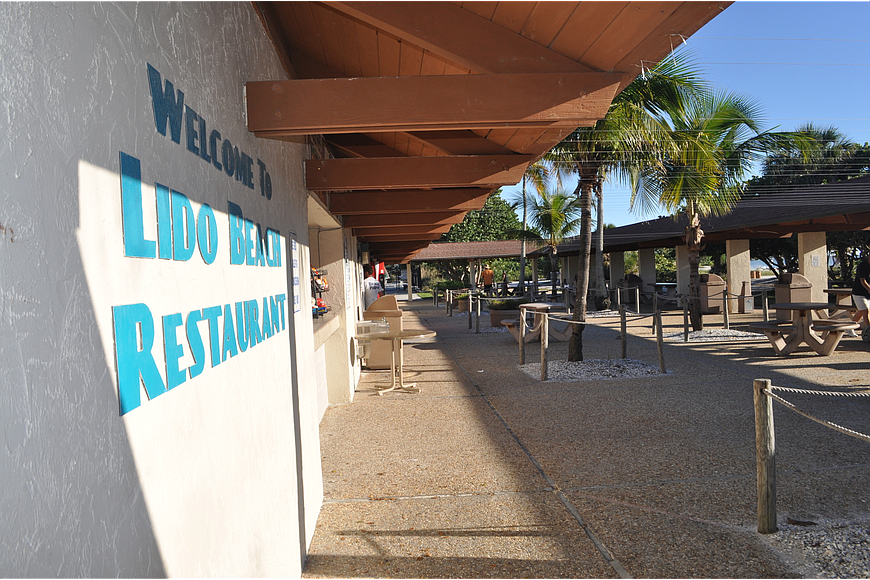- May 17, 2025
-
-
Loading

Loading

The City Commission approved a lease agreement for the Lido Beach pool and pavilion Monday, giving a private group the responsibility for managing the city-owned property — and the right to add and operate a 200-seat restaurant.
Lido Beach Redevelopment Partners LLC, led by Daiquiri Deck co-owner Troy Syprett and property management professional Gavin Meshad, will take control of the property pending approval of proposed renovations. In addition to the restaurant, the group’s plans include improving the bathrooms and adding a Tiki bar, splash pad and playground to the 2.4-acre pavilion area.
The lease, which begins May 2018, runs for an initial period of 10 years. It includes two additional 10-year options, which the tenant can initiate on its own.
The commission’s 4-1 decision came after five hours of discussion, underscoring the controversial nature of the plans. Several Lido Key residents spoke in opposition to the proposal, arguing it would change the character of the beach and potentially limit public access to the property. The scope of the restaurant, in particular, was a point of concern.
“It’s much larger, much more commercialized,” said Carl Shoffstall, president of the Lido Key Residents Association. “It’s not going to work for Lido.”
Syprett and Meshad pushed back against that narrative, highlighting amenities — including the splash pad, playground and an ice cream shop — they believed would foster a family-friendly atmosphere at the pavilion. Some speakers at Monday’s meeting offered support for the proposal. They stated the beach property was in need of improvements, and that Lido Beach Redevelopment Partners was willing to invest private money.
City staff made a similar argument in favor of the project. In addition to the private group spending nearly $4 million on renovations, City Manager Tom Barwin said the city would save about $150,000 annually on operating expenses at the pavilion. The deal also frees up $1.25 million allocated for improvements to the pavilion bathrooms, enabling officials to spend that money elsewhere.
“The city is like a big house, with a lot of upkeep necessary around town,” Barwin said.
Other commenters criticized the specific terms of the lease agreement. The rent starts at $80,000 annually and scales up to $100,000 or higher by year three, depending on the revenue generated at the property. Although several speakers said that figure was favorable for Lido Beach Redevelopment Partners, Meshad said his group was taking on risk by investing money into the property up front.
“If the city was willing to put in the $3 or $4 million, the rental structure would be different,” Meshad said. “I’d very much like the city to do that.”
Ultimately, the majority of the commission said they felt comfortable the lease agreement would benefit the city financially without negatively affecting the character of Lido Beach. Vice Mayor Liz Alpert said she believed it was the best option available for improving the pavilion area.
“If the residents don’t want something like this and they want to keep it just like it is, $1.2 million isn’t going to fix it up,” Alpert said, referencing the money previously allocated for improvements. “It might fix up the bathrooms, but that’s about it.”
Commissioner Hagen Brody believes even those residents who spoke against the proposal will eventually come to enjoy the new-look pavilion. He said the plans drew a higher volume of opposition because it sought to change the status quo.
“It’s not there,” Brody said. “It doesn’t exist yet, so you don’t have people coming out in droves to support it.”
Commissioner Jen Ahearn-Koch was the lone dissenting vote. She said resident concern drove her decision, and she remained unconvinced the lease terms were favorable for the city.
“My boss is the community, and my boss is telling me they don’t want this,” Ahearn-Koch said.
The lease agreement stipulates that Lido Beach Redevelopment Partners must complete the initial improvements by June 30, 2019. The full text of the lease is available on the city website.
Despite the criticism from Lido residents, Syprett and Meshad said they were dedicated to operating the pavilion in a way that serves the community in which they live.
“We’re not some outside developer that owns a bunch of resorts,” Meshad said. “We’re local boys.”